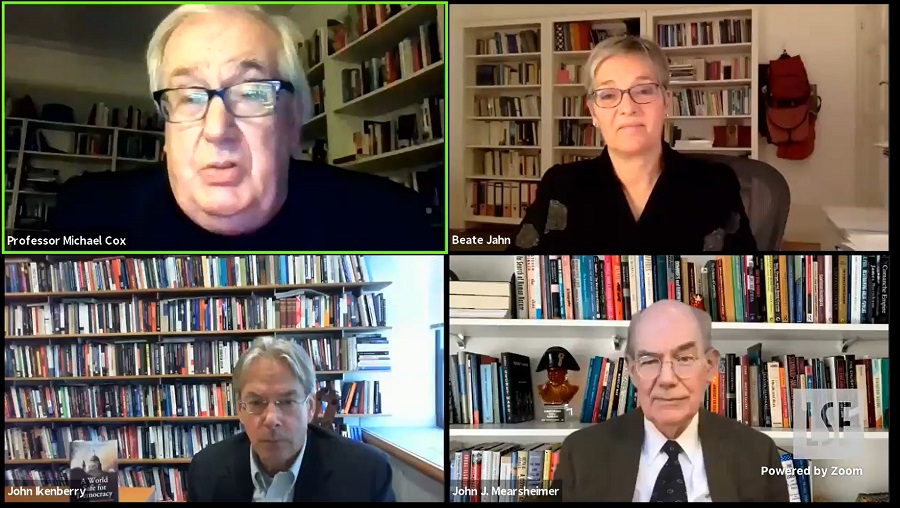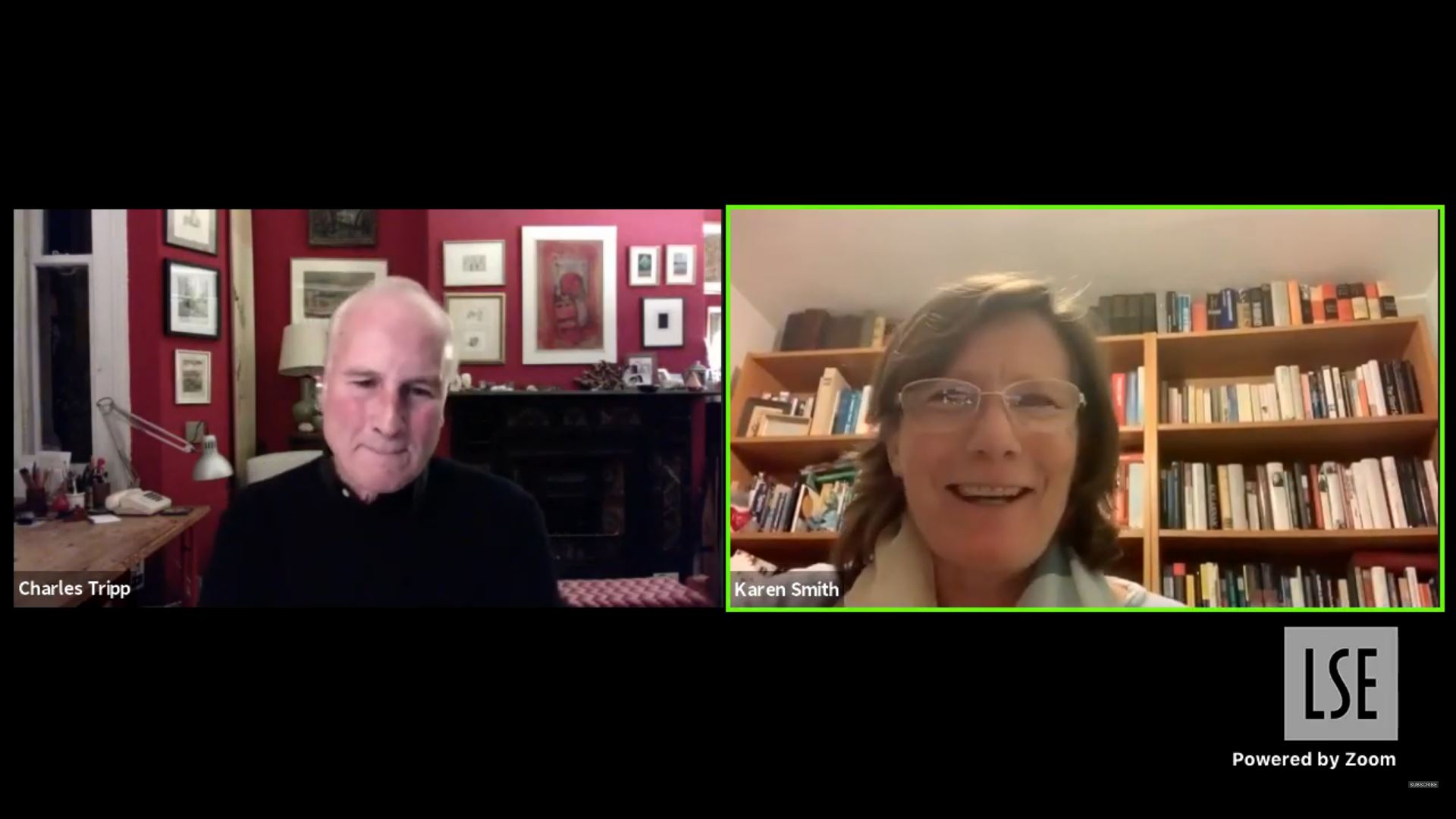On Tuesday 16 April 2021, Ben Bradford, Rachel Neild, Heather Sutton, Shota Utiashvili, Zoha Waseem and Liam O’Shea came together online to discuss police organisation reform, in the second in the How to Reform the Police four-part series organised by LSE IDEAS and the Urban Violence Research Network to look at lessons on police reform from the Global South and Global North.
(The first seminar was run by co-organisers from the Urban Violence Research Network, University College London).
The series was developed by Dr Liam O’Shea, LSE’s DINAM Research Fellow in the Department of International Relations, and Dr Zoha Waseem from the Institute for Global City Policing, UCL.
- Find out more about this event and speakers
- Listen to or download the audio podcast (90 mins)
- Watch on YouTube (90 mins)

This webinar explored a key question on the mind of anyone interested in police malpractice: how are police organisations actually reformed?
This complex question doesn’t lend itself to simple answers but the panel’s speakers – Shota Utiashvili, Heather Sutton, Ben Bradford and Rachel Neild – explained the results of different approaches to organisational change tried in very different geographical contexts. Importantly, too, in a policy area replete with examples of limited impact, the speakers point to factors that can contribute to success.
Achieving institutional change
Thinking about how various factors piece together helps to achieve both institutional and public buy-in, as well as support the sustainability and longevity of reform.
 Heather Sutton, Public Safety Expert at the Inter-American Development Bank, noted we want to see institutional change take place as opposed to superficial change. Looking at the whole picture is of the utmost importance and a holistic approach can avoid superficial change happening in silos. A coherent approach is developed when the logistical features of reform (eg modernising equipment and techniques, the provision of training and the vetting and hiring of staff) are thought about in tandem with the wider contextual features. Thinking about how various factors piece together helps to achieve both institutional and public buy-in, as well as support the sustainability and longevity of reform.
Heather Sutton, Public Safety Expert at the Inter-American Development Bank, noted we want to see institutional change take place as opposed to superficial change. Looking at the whole picture is of the utmost importance and a holistic approach can avoid superficial change happening in silos. A coherent approach is developed when the logistical features of reform (eg modernising equipment and techniques, the provision of training and the vetting and hiring of staff) are thought about in tandem with the wider contextual features. Thinking about how various factors piece together helps to achieve both institutional and public buy-in, as well as support the sustainability and longevity of reform.
The importance of context
The context in which reform takes place is also hugely important to achieving institutional change. Without appropriate political will and capacity, the likelihood of successful reform is much reduced. Thinking about context is also an important part of gaining trust from the public.
Without appropriate political will and capacity, the likelihood of successful reform is much reduced.
 Shota Utiashvili, Senior Fellow at the Georgian Foundation for Strategic and International Studies, gave the example of police reform in Georgia following the 2003 Rose Revolution. After the collapse of the Soviet Union, rampant corruption completely undermined public trust in the police. The revolutionaries prioritised rebuilding this. They fired almost all of the traffic police, who were the most visible manifestation of police corruption. By replacing them with a newly formed ‘Patrol Police’ the government drastically and rapidly improved public opinion, with no negative impact on policing of traffic incidents.
Shota Utiashvili, Senior Fellow at the Georgian Foundation for Strategic and International Studies, gave the example of police reform in Georgia following the 2003 Rose Revolution. After the collapse of the Soviet Union, rampant corruption completely undermined public trust in the police. The revolutionaries prioritised rebuilding this. They fired almost all of the traffic police, who were the most visible manifestation of police corruption. By replacing them with a newly formed ‘Patrol Police’ the government drastically and rapidly improved public opinion, with no negative impact on policing of traffic incidents.
Changing the culture within police institutions
Cultural reform within police institutions is crucial as it allows new methods of policing to be adopted by frontline officers and encourages changes in practice. The successful introduction of any new initiative – such as evidence-based policing or community policing principles – first requires the buy-in of police staff.
The successful introduction of any new initiative … first requires the buy-in of police staff.
 Changing how officers relate to their organisation on an individual and personal basis increases the likelihood that officers will adopt new training and make changes to their behaviours. Drawing on his recent research, speaker Ben Bradford, Professor of Global City Policing at UCL, noted that officers who felt they worked for an organisation they perceive to be “fair and just” were more likely to accept and implement newly taught evidence-based techniques than those who did not. The treatment of staff and positive engagement between policy developers and the police force are two significant ways in which this buy-in can be encouraged and achieved.
Changing how officers relate to their organisation on an individual and personal basis increases the likelihood that officers will adopt new training and make changes to their behaviours. Drawing on his recent research, speaker Ben Bradford, Professor of Global City Policing at UCL, noted that officers who felt they worked for an organisation they perceive to be “fair and just” were more likely to accept and implement newly taught evidence-based techniques than those who did not. The treatment of staff and positive engagement between policy developers and the police force are two significant ways in which this buy-in can be encouraged and achieved.
Civil society participation
Issues tend to occur when citizens feel “over policed and under protected”
 Civil society can play a key role in improving police observation of human rights. Rachel Neild, Division Director at Open Society Justice Initiative, emphasised the importance of understanding reform from a human rights perspective. Issues tend to occur when citizens feel “over policed and under protected”. But whilst combative approaches employed by civil society actors are sometimes a necessity, positive engagement with the police may be more productive.
Civil society can play a key role in improving police observation of human rights. Rachel Neild, Division Director at Open Society Justice Initiative, emphasised the importance of understanding reform from a human rights perspective. Issues tend to occur when citizens feel “over policed and under protected”. But whilst combative approaches employed by civil society actors are sometimes a necessity, positive engagement with the police may be more productive.
Having police allies is often compulsory for those seeking access to police networks. An important feature of community policing is the ability to build networks of experts, where police representatives can be drawn upon for access, policy implementation and wider research purposes. Collaboration between civil society organisations and police officers can also improve police reform. Heather Sutton also noted that civil society participation was a fundamental aspect of the Principal Reforms in Honduras, specifically ensuring that citizen complaints against the police produce action by seeing those officers removed from duty.
Reform is a multifaceted and non-linear process
Police reform is multifaceted and complex which underlines the importance of understanding context and adopting non-linear approaches to reform. But, whilst there is no ‘one-size-fits-all’ model, it is important to build on lessons from previous police reform initiatives which can inform future design and implementation, as well as organisational change in other contexts. There is some way to go, in research and practice, towards synthesising lessons not only on ‘what works’ in Western contexts but also in other environments. The cases discussed demonstrate the potential for harnessing lessons from the Global North and South.
Photo by Marília Castelli on Unsplash






1 Comments